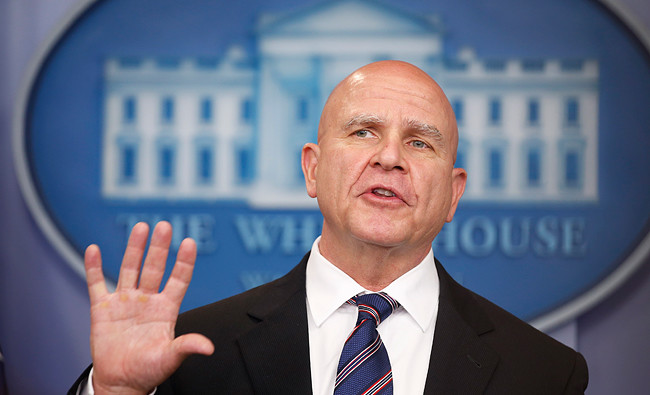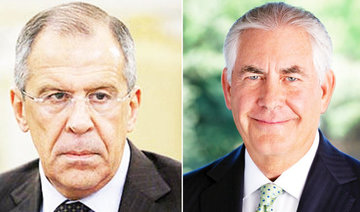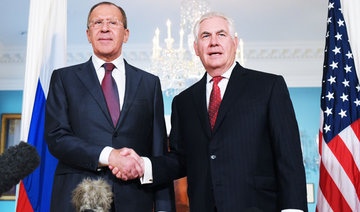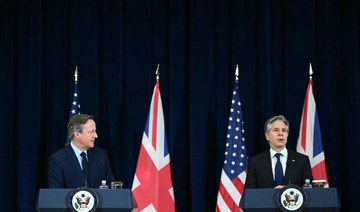WASHINGTON: Pushing back against allegations of damaging intelligence disclosures, President Donald Trump’s national security adviser insisted Tuesday that Trump’s revelations to Russian officials about activities by the Daesh group were “wholly appropriate” and amounted to a routine sharing of information.
H.R. McMaster added that none of the US officials present for the president’s Oval Office meeting with the Russian foreign minister last week “felt in any way that that conversation was inappropriate.” He used the words “wholly appropriate” nine separate times.
Trump himself claimed the authority to share “facts pertaining to terrorism” and airline safety with Russia, saying in a pair of tweets he has “an absolute right” as president to do so. Trump’s tweets did not say whether he revealed classified information about ISIS, as published reports have said and as a US official told The Associated Press.
McMaster, in a White House briefing, said: “In the context of that discussion, what the president discussed with the foreign minister was wholly appropriate to that conversation and is consistent with the routine sharing of information between the president and any leaders with whom he is engaged.”
The White House has not expressly denied that classified information was disclosed in the Oval Office meeting between Trump and Russian diplomats last week. The Kremlin dismissed the reports as “complete nonsense.”
The news reverberated around the world as countries started second-guessing their own intelligence-sharing agreements with the US
A senior European intelligence official told the AP his country might stop sharing information with the United States if it confirms that Trump shared classified details with Russian officials. Such sharing “could be a risk for our sources,” the official said. The official spoke only on condition that neither he nor his country be identified, because he was not authorized to discuss the matter publicly.
On Capitol Hill, Democrats and Republicans alike expressed concern about the president’s disclosures. Sen. John McCain, R-Arizona, called the reports “deeply disturbing” and said they could affect the willingness of US allies and partners to share intelligence with the US
Senate Majority Leader Mitch McConnell called the intelligence uproar a distraction from GOP priorities such as tax reform and replacing the health care law.
“I think we could do with a little less drama from the White House on a lot of things so that we can focus on our agenda,” he told Bloomberg Business.
Doug Andres, a spokesman for House Speaker Paul Ryan, said the speaker was looking for “a full explanation of the facts from the administration.”
Minority Leader Chuck Schumer, D-N.Y., called for Congress to have immediate access to a transcript of Trump’s meeting with the Russians, saying that if Trump refuses, Americans will doubt that their president is capable of safeguarding critical secrets.
At the White House, Trump said in his tweets, “I wanted to share with Russia (at an openly scheduled W.H. meeting) which I have the absolute right to do, facts pertaining ... to terrorism and airline flight safety. Humanitarian reasons, plus I want Russia to greatly step up their fight against ISIS & terrorism.”
Trump shared details about an Islamic State terror threat related to the use of laptop computers on aircraft with Russian Foreign Minister Sergey Lavrov and Russian ambassador to the US Sergey Kislyak, a senior USofficial told AP. The classified information had been shared with the president by an ally, violating the confidentiality of an intelligence-sharing agreement with that country, the official said.
Trump later was informed that he had broken protocol and White House officials placed calls to the National Security Agency and the CIA looking to minimize any damage.
The official, who spoke on condition of anonymity because the official was not authorized to speak publicly, would not say which country’s intelligence was divulged.
The disclosure put a source of intelligence on the Islamic State at risk, according to The Washington Post, which first reported the disclosure on Monday.
The CIA and the Office of the Director of National Intelligence have declined to comment.
The US official said that Trump boasted about his access to classified intelligence in last week’s meeting with Lavrov and Kislyak. An excerpt from an official transcript of the meeting reveals that Trump told them, “I get great intel. I have people brief me on great intel every day,” he said.
On Monday, McMaster told reporters: “The president and the foreign minister reviewed a range of common threats to our two countries including threats to civil aviation. At no time, at no time were intelligence sources or methods discussed and the president did not disclose any military operations that were not already publicly known.”
The revelations could further damage Trump’s already fraught relationship with US intelligence agencies. He’s openly questioned the competency of intelligence officials and challenged their high-confidence assessment that Russia meddled in last year’s presidential election to help him win. His criticism has been followed by a steady stream of leaks to the media that have been damaging to Trump and exposed an FBI investigation into his associates’ possible ties to Russia.
The disclosure also risks harming his credibility with US partners around the world ahead of his first overseas trip. The White House was already reeling from its botched handling of Trump’s decision last week to fire James Comey, the FBI director who was overseeing the Russia investigation.
The Royal Court in Jordan said that King Abdullah II was to speak by telephone with Trump later Tuesday, a conversation that was scheduled last week.
The revelation also prompted cries of hypocrisy. Trump spent the campaign arguing that his opponent, former Secretary of State Hillary Clinton, should be locked up for careless handling of classified information.
Secretary of State Rex Tillerson disputed the report. He said Trump discussed a range of subjects with the Russians, including “common efforts and threats regarding counter-terrorism.” The nature of specific threats was discussed, he said, but not sources, methods or military operations.
Trump talk with Russians ‘wholly appropriate,’ adviser says
Trump talk with Russians ‘wholly appropriate,’ adviser says

UK investigating Hamas’ claim that British hostage killed in Gaza

- Foreign secretary confirms viewing video
LONDON: The UK’s Foreign Office said on Sunday it was investigating a claim by Hamas that a British-Israeli hostage in Gaza had died from injuries sustained in an Israeli airstrike over a month ago.
Nadav Popplewell, 51, was captured along with his mother Channah Peri on Oct. 7 during a border incursion when the Palestinian group launched a surprise attack on Israel.
The Foreign Office said it was actively seeking more information on the matter.
Popplewell’s family has requested media outlets refrain from airing footage released by Hamas, showing him in captivity with visible injuries, the BBC reported.
The UK’s Foreign Secretary David Cameron, speaking to the BBC’s Laura Kuenssberg, confirmed viewing the video but provided no further updates on the investigation.
Cameron said: “We don’t want to say anything until we have better information.”
He described Hamas as “callous” for releasing the video and playing “with the family’s emotions in that way.”
The Foreign Office added that the department’s thoughts “are with his family at this extremely distressing time.”
The Israeli military has not issued a statement on the matter.
Israel’s military campaign in Gaza to destroy Hamas has killed over 34,900 people, the majority of whom are women and children, according to the Gaza Health Ministry.
Israel has reported that 128 hostages are unaccounted for.
UK mountaineer logs most Everest climbs by a foreigner, Nepali makes 29th ascent

- Both climbers used Southeast Ridge route to summit
- They were on separate expeditions guiding their clients
KATMANDU: A British climber and a Nepali guide have broken their own records for most climbs of Mount Everest, the world’s highest mountain, hiking officials said on Sunday.
Rakesh Gurung, director of Nepal’s Department of Tourism, said Britain’s Kenton Cool, 50, and Nepali guide Kami Rita Sherpa, 54, climbed the 8,849-meter (29,032 foot) peak for the 18th and 29th time, respectively.
They were on separate expeditions guiding their clients.
“He just keeps going and going... amazing guy!” Garrett Madison of the US-based expedition organizing company Madison Mountaineering said of the Nepali climber. Madison had teamed up with Kami Rita to climb the summits of Everest, Lhotse, and K2 in 2014.
K2, located in Pakistan, is the world’s second-highest mountain and Lhotse in Nepal is the fourth-tallest.
Lukas Furtenbach of the Austrian expedition operator Furtenbach Adventures called Cool’s feat remarkable.
“He is a fundamental part of the Everest guiding industry. Kenton Cool is an institution,” Furtenbach, who is leading an expedition from the Chinese side of Everest, told Reuters.
Both climbers used the Southeast Ridge route to the summit.
Pioneered by the first summiteers, New Zealander Sir Edmund Hillary and Sherpa Tenzing Norgay in 1953, the route remains the most popular path to the Everest summit.
Kami Rita first climbed Everest in 1994 and has done so almost every year since, except for three years when authorities closed the mountain for various reasons.
He climbed the mountain twice last year.
Mountain climbing is a major tourism activity and a source of income as well as employment for Nepal, home to eight of the world’s 14 tallest peaks, including Everest.
Nepal has issued 414 permits, each costing $11,000 to climbers for the climbing season that ends this month.
Banning UK arms exports to Israel would strengthen Hamas, UK’s Cameron says

- Cameron said he did not support an operation in Rafah in the absence of a plan to protect hundreds of thousands of civilians
LONDON: Stopping British arms sales to Israel if it launches a ground assault on Rafah in the Gaza Strip would strengthen Hamas, Britain’s Foreign Secretary David Cameron said on Sunday.
Israel ordered Palestinians to evacuate more of the southern city on Saturday in an indication it was pressing ahead with its plans for a ground attack, despite US President Joe Biden’s threat to withhold the supply of some weapons if it did so.
Cameron said he did not support an operation in Rafah in the absence of a plan to protect hundreds of thousands of civilians sheltering in the southern border city.
However, Britain was in a “completely different position” to the United States in terms of providing arms to Israel, he said, noting that the less than 1 percent of Israel’s weapons that came from Britain were already controlled by a strict licensing system.
“We could, if we chose to, make a sort of political message and say we are going to take that political step,” he told the BBC’s Laura Kuenssberg.
“The last time I was urged to do that (...), just a few days later there was a brutal attack by Iran on Israel, including 140 cruise missiles,” he added.
Cameron said the “better answer” would be for Hamas, which controls Gaza, to accept a hostage deal.
“Just to simply announce today we’re going to change our whole approach to arms exports rather than go through our careful process, it would strengthen Hamas, it would make a hostage deal less likely, I don’t think it would be the right approach,” he said.
Hamas attacked southern Israel on Oct. 7, killing some 1,200 people and taking more than 250 people hostage, according to Israeli tallies.
Israel’s military response in Gaza has killed close to 35,000 Palestinians, according to Gaza’s health ministry.
‘Completely helpless’: Afghanistan’s north struggles to get aid after deadly floods

- Thousands of houses and livestock were also wiped out by the flash floods
- Afghanistan is prone to natural disasters, considered vulnerable to climate change
KABUL: Survivors of the deadly flash floods that ripped through northern Afghanistan were still struggling without basic aid on Sunday, as the official death toll rose to over 300.
Heavy rains on Friday triggered flash floods across at least seven provinces, including Baghlan, Ghor, Badakhshan and Takhar, injuring more than 1,600 people and destroyed about 2,600 houses, according to the latest data from Afghanistan’s Ministry of Refugees.
Many people remain missing and livestock were wiped out as survivors picked through muddy, debris-littered streets and damaged buildings over the weekend, while authorities and humanitarian agencies deployed aid and rescue workers.
“All available resources are being mobilized, and relevant ministries and agencies are actively engaged in delivering urgent aid,” Mullah Abdul Ghani Baradar Akhund, Afghanistan’s deputy minister for economic affairs, told survivors in Baghlan province on Sunday, as he reassured “unwavering support” from the Taliban-led government “until their lives are restored to normalcy.”
But some people in the province, which bore the brunt of the deluges, said that aid has yet to reach them.
“We haven’t received any support from the government or aid organizations yet. Everyone comes and asks us questions, then they go back,” Ghulam Nabi, who is from the province’s Burka district, told Arab News in a phone interview.
“We lost our houses and our lives. Everything we had is under mud now. The agriculture land and livestock, our only source of livelihood, are also completely destroyed. We don’t have the basic means to cook food for ourselves.”
Since mid-April, flash flooding and other floods had left scores of people dead and destroyed farmlands across Afghanistan, a country where 80 percent of its more than 41 million people depend on agriculture to survive.
The South Asian nation is prone to natural disasters and is considered by the UN to be one of countries most vulnerable to climate change.
Aid group Save the Children said about 600,000 people, half of them children, live in the five districts in Baghlan that have been severely impacted by the recent floods.
“Lives and livelihoods have been washed away. The flash floods tore through villages, sweeping away homes and killing livestock. Children have lost everything,” Arshad Malik, the group’s country director in Afghanistan, said in a statement.
Most of the affected areas are still cut off on Sunday, inaccessible by trucks as roads and bridges were damaged by the floods, which also impacted other public infrastructure.
People were struggling to access essential health services, the World Health Organization said in a statement, as “several health facilities remain non-operational.”
Abdul Fatah Jawad, director of Ehsas Welfare and Social Services Organization, said that many of the flood survivors were still in shock.
“People are so scared and traumatized. Most houses that survived the flooding are emptied as people fear more floods. Families took refuge in school yards and deserted areas far from residential houses,” Jawad told Arab News.
He said families are in urgent need of basic goods, such as food, drinking water, medicine, tents, blankets and shelter. Since Saturday, his organization has managed to deliver cooked food for hundreds of families.
“People, particularly children, need to eat something … They also need cash to rebuild their houses and their businesses,” he said. “Some families lost everything — house, land, livestock, business. They are completely helpless.”
Indonesia welcomes expanded Makkah Route access as pilgrims start departing for Hajj

- Indonesia will be sending 241,000 pilgrims this pilgrimage season
- The Makkah Route initiative is available in 3 Indonesian cities
JAKARTA: Indonesia on Sunday welcomed the expansion of the Makkah Route initiative to three airports, as the first batch of the country’s largest Hajj contingent to date departed for Saudi Arabia.
The world’s biggest Muslim-majority nation will be sending 241,000 pilgrims to Saudi Arabia this year for the spiritual journey that is one of the five pillars of Islam.
Although the Hajj this year is expected to start on June 14 and end on June 19, many pilgrims depart early to make the most of the once-in-a-lifetime opportunity to fulfill their religious duty.
As Indonesia’s first Hajj flight carrying nearly 400 pilgrims departed from Soekarno-Hatta International Airport in the early hours of Sunday, Religious Affairs Minister Yaqut Cholil Qoumas said he was grateful to the Saudi leadership for adding the Makkah Route initiative in other Indonesian cities.
“On behalf of the Indonesian government, I thank the Saudi government for providing additional fast-track facilities, other than Jakarta, it is now available in Solo and Surabaya,” Qoumas said after he sent off the first group in the Indonesian capital.
“Hopefully this will give ease, benefit, and a smooth journey for all Indonesian pilgrims.”
Launched in 2019, the Kingdom’s Makkah Route initiative is a pre-travel program created to help pilgrims meet all the visa, customs and health requirements at the airport of origin, and save them long hours of waiting before and upon arrival in Saudi Arabia.
This year, the initiative will benefit more than 128,000 Indonesian pilgrims who will leave from the three selected cities.
“We saw the fast-track service at the airport. It doesn’t take any longer than two minutes. It’s very fast, very helpful for the pilgrims. When they arrive, they don’t have to go through any other immigration process, they can just hop on the bus and begin their worship in the holy land,” Qoumas said.
This year, Saudi Arabia increased Indonesia’s quota of pilgrims by 20,000, from 221,000 last year, making it the biggest in the Southeast Asian nation’s history.
The highest quota in previous years came before the COVID-19 pandemic, in 2019, when the Kingdom approved a quota of 231,000 pilgrims for Indonesia.
The additional quota will help shorten the wait for some pilgrims by a few years, which is especially important for elderly pilgrims. Many Indonesians have to wait up to 45 years for their turn, according to official estimates.
Ace Hasan Syadzili, a member of Indonesia’s House of Representatives, was also present to see off the first batch of pilgrims on Sunday, commended the Makkah Route initiative.
“This is certainly helpful. Looking at the previous years, without fast track the immigration can take between two to five hours. But this fast track will speed up services for Hajj pilgrims,” Syadzili said.
“We will continue to oversee and supervise the Hajj management process this year so that it is in line with the people’s expectations.”




















